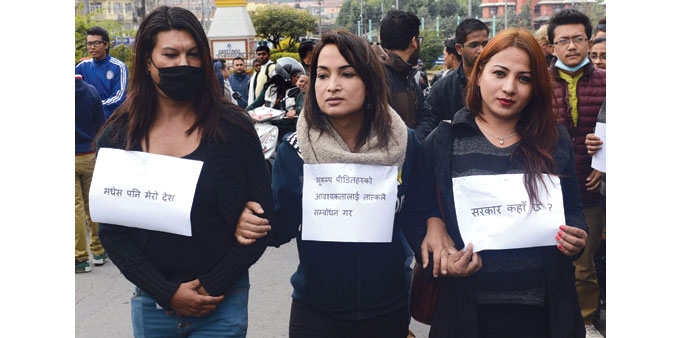Activists carry placards during a protest rally against the ongoing dispute between Nepal and India, in Kathmandu yesterday. Scores of trucks have been stranded at a key border checkpoint for over two months following protests by ethnic minorities over the Himalayan nation’s new constitution introduced in September. Movement across other border checkpoints has also slowed to a crawl, leading to a nationwide fuel crisis and short supplies of medicines.
IANS
Kathmandu
Members of the Communist Party of Nepal-Maoist yesterday said they set on fire a vehicle belonging to the Indian Embassy in Kathmandu. However, both police and embassy officials
refuted the claim.
Party members claimed that they burnt the vehicle and smashed its window panes to protest India’s blockade of road transport of supplies of food items and other commodities to Nepal.
The vehicle was parked at the Indian Embassy premises here and no one was seated in it.
The Indian Embassy said the vehicle belonged to one of its employees.
Both embassy officials and police refuted the claim of the CPN-Maoist, led by Netra Bikram Chand, and said the vehicle caught fire due to a
technical fault.
Meanwhile, the CPN-Maoist has called for a shutdown in Nepal today to protest India’s blockade.
Nepal is heavily dependent on India for fuel and other supplies, but little cargo has crossed the border from India since protests against the constitution broke out in late
September.
As a nationwide fuel shortage deepens, medical supplies are now also running dry in the impoverished, landlocked country.
Nearly 50 people have been killed in clashes between police and people protesting against the constitution, which was introduced in September after deadly earthquakes pushed warring political parties to reach agreement.
Demonstrators from the Madhesi ethnic minority, mainly from the southern plains, have been blockading the main Birgunj border crossing, protesting against the constitution they say leaves them politically
marginalised.
Movement across other border checkpoints has also slowed to a crawl, prompting fuel rationing and forcing the government to start selling firewood as residents run out of cooking gas.
Nepal’s government accuses India, which has criticised the new constitution, of retaliating with an “unofficial blockade”.
New Delhi has denied the charge and urged dialogue with the protesting Madhesis, who have close cultural, linguistic and family ties to Indians living across the border.
Nepal’s Prime Minister K P Sharma Oli has warned that the blockade is having an impact “several times more than the quake” that struck in April.
But several rounds of talks between the government and the protesting parties have failed to reach an agreement.
The constitution, the first drawn up by elected representatives, was meant to cement peace and bolster Nepal’s transformation to a democratic republic after decades of political instability and a 10-year Maoist insurgency.

